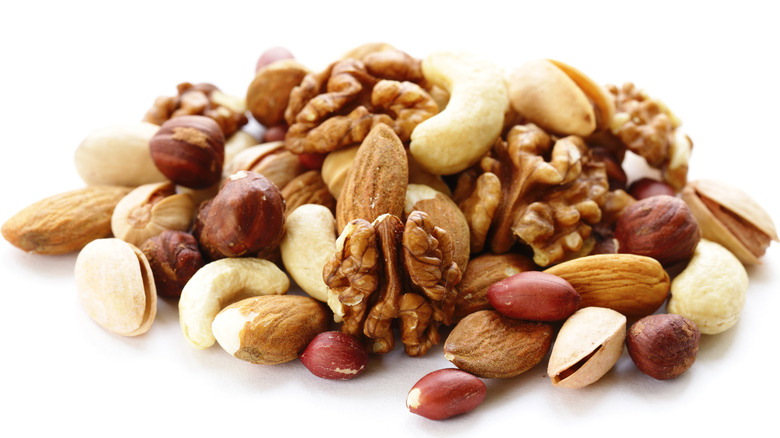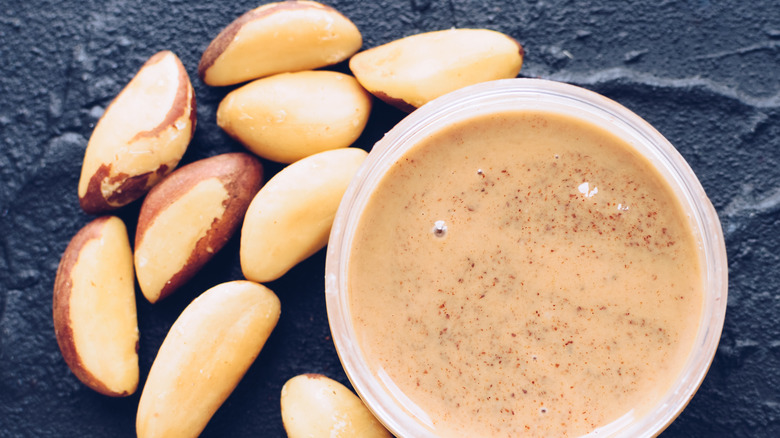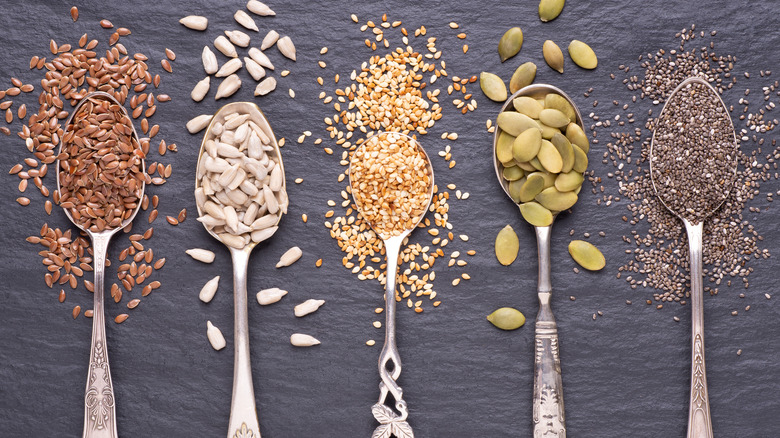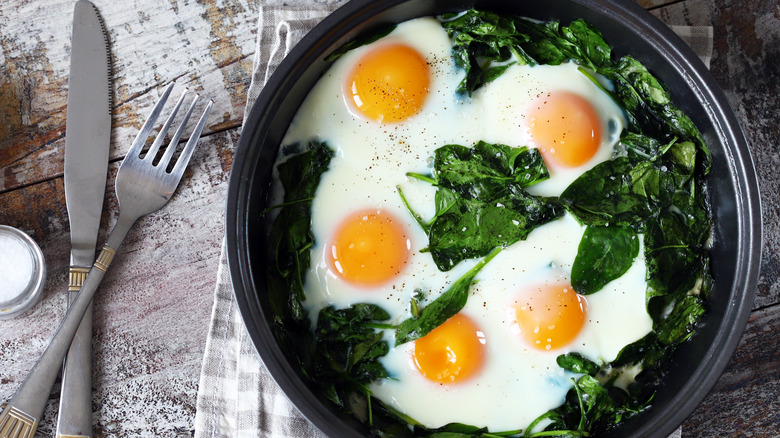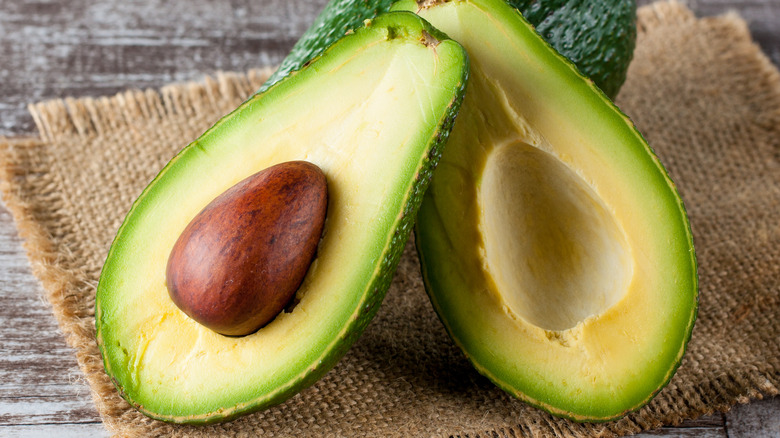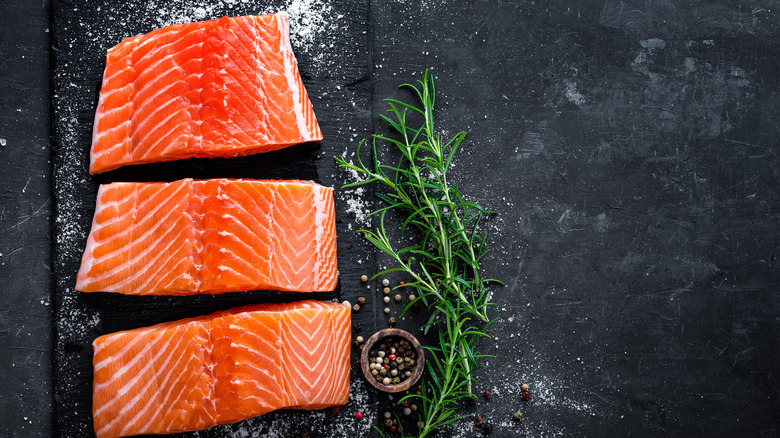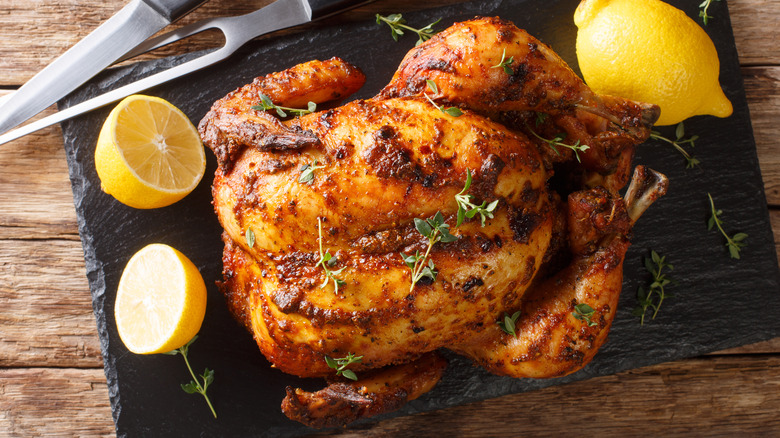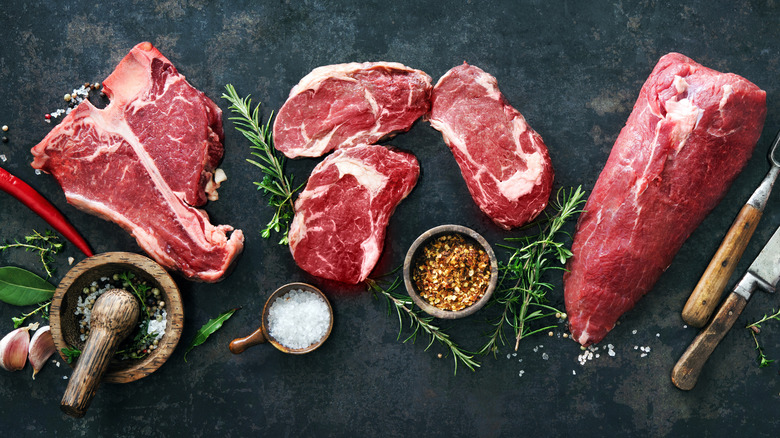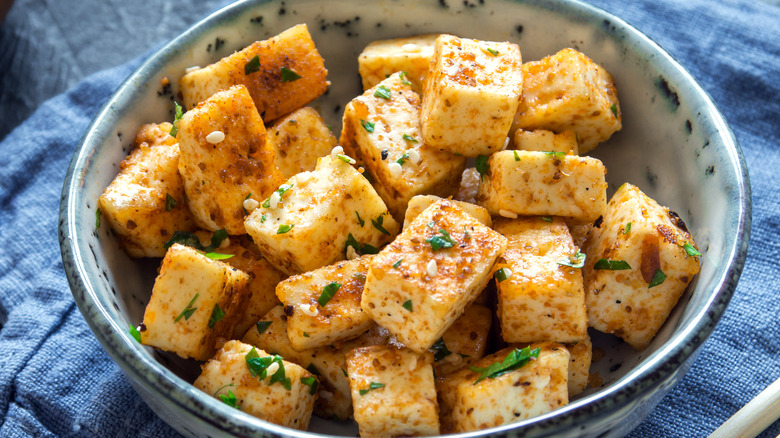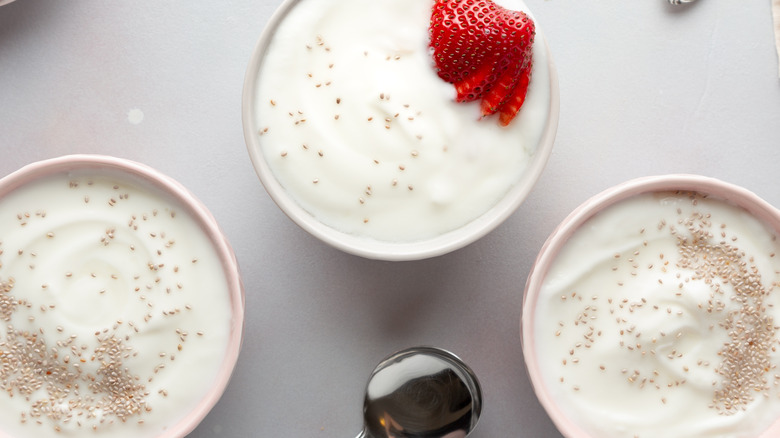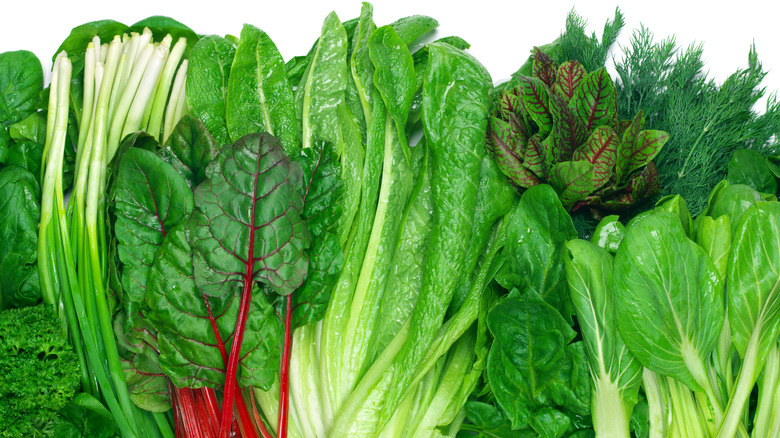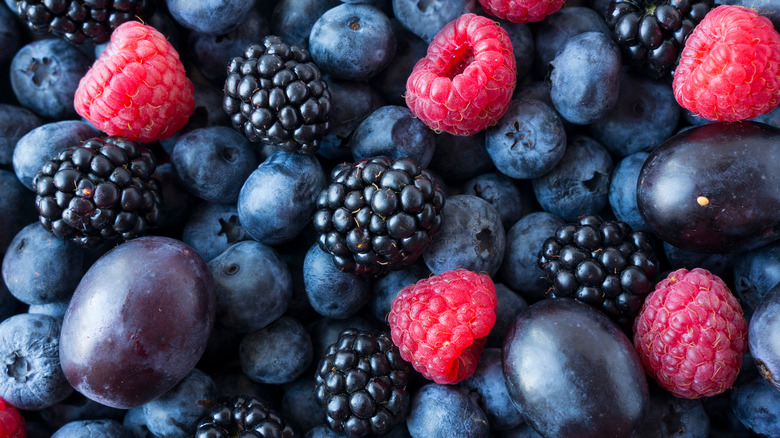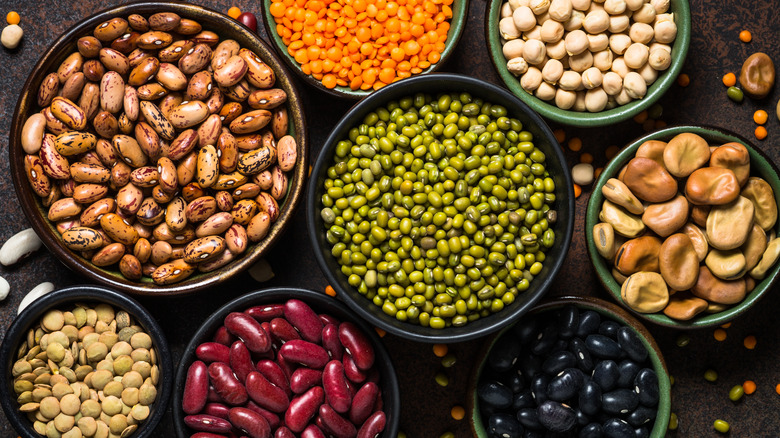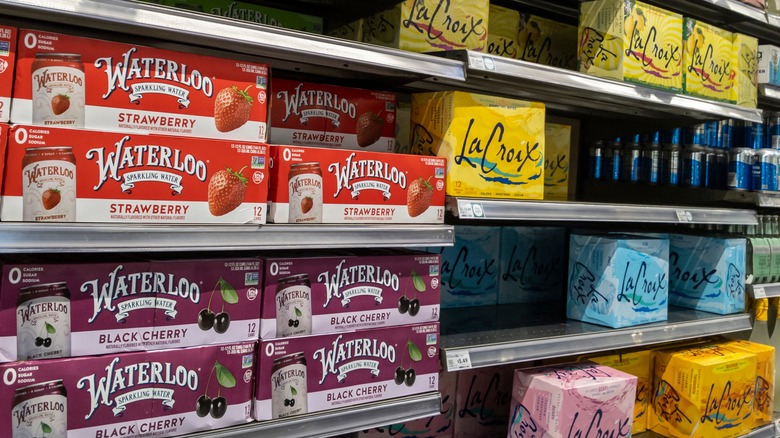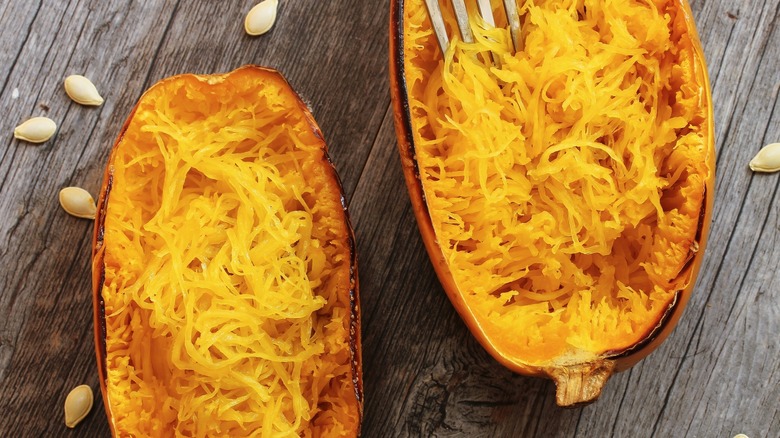If You're On The Keto Diet, Stick To These Foods
The ketogenic, or keto, diet is effective for rapid weight loss, according to Dr. Massimiliano Caprio, endocrinologist and author of a 2020 research paper about the keto diet. According the paper, which was published in the Journal of Translational Medicine, going keto could prove game-changing for people with obesity and related metabolic issues.
The keto diet is based on a formula for macronutrients that assumes 55 to 60 percent of the day's calories are from fat, 30 to 35 percent from protein, and 5 to 10 percent from carbohydrates. In a daily 2,000-calorie diet, what this might look like is 165 grams of fat, 40 grams of carbs, and 75 grams of protein, according to Harvard Health Letter.
Following this formula forces the body to metabolize fat instead of carbohydrates for energy by producing a compound called ketone bodies. This process is known as ketogenesis and supports not only rapid weight loss but also improvement in conditions caused or worsened by inflammation, Dr. Caprio told Health Digest. What the keto diet is not, however, is a free license to eat all the fatty foods you want. For optimal weight loss and health benefits, you will want to stick to these foods when you're on the keto diet.
Choose tree nuts on the keto diet, but keep portions in control
As long as you're not allergic to them, tree nuts should play an important role in your keto diet, according to Dr. Massimiliano Caprio, endocrinologist and author of a 2020 paper on important benefits of the keto diet. Tree nuts are rich in healthy fats and protein, not to mention, fiber, vitamins, and minerals. However, it is important to remember that all tree nuts also contain carbohydrates. Therefore, following the keto plan requires taking into account how many carbs are in whichever nuts you choose to eat.
"The best nuts you can eat on keto," according to registered dietitian Trista Best, are pecans and brazil nuts, because each has between 3 and 4 grams of net carbohydrates per 1-ounce serving. Other nuts you can stick with on while on the keto diet are macadamia, pine, walnut, and hazelnut, as long as you take grams of carbohydrates into account in your daily macros. Among the worst nuts you can include on this plan are cashews, which contain 8 grams of net carbs per one-ounce serving.
Stick to these nut butters if you're on the keto diet
Nut butter is high in protein and fiber, which improves digestion, according to board-certified naturopath and holistic health coach Olivia Audrey. Nut butter is also a great source of plant-based protein, ideal for vegans wishing to follow a keto diet. Like nuts, nut butters can and should be a mainstay on keto diets, but it's important to clarify that we're talking only about the ones that are not processed with sugar or other additives, as that can quickly undermine the ketogenic benefits of the food.
As with nuts, the best nut butters are made from nuts that contain the fewest carbohydrates, physician Leann Poston told Health Digest. For example, two tablespoons of pure almond butter contains 3 grams of net carbs. The same portion of pure cashew butter contains 4 grams of net carbs, according to registered dietitian Alicia Galvin, a resident dietitian for Sovereign Laboratories.
Enjoy seeds on the keto diet, but do keep an eye on your carb and protein count
The majority of seeds are safe and healthy to eat while on the keto diet, according to registered dietitian Trista Best. "Seeds offer a vast amount of nutrients including fiber and omega-3 fatty acids, as well as vitamin E, which most Americans are lacking in their diet," she told Health Digest.
Hemp seeds and flax seeds are great for keto because each contains only one gram of net carbs per 1-ounce serving. Additionally, chia seeds contain just 2 grams of carbohydrates in a 1-ounce serving. Sticking with them can help your keto goals, provided you don't forget to count your carb grams in your total day's macros.
By contrast, sunflower seeds are significantly higher in carbs. You can include them in your keto diet, according to Alicia Galvin, a resident dietitian for Sovereign Laboratories, just so long as you count the carbs in your daily macros.
Eggs can be an important part of a heathy and successful keto diet
A single chicken egg contains 7 grams of protein and 5 grams of fat, along with iron, vitamins, minerals, and carotenoids. Eggs are also a "powerhouse of disease-fighting nutrients like lutein and zeaxanthin," according to WebMD.
Eggs have gotten an unfairly bad rap because they are naturally high in cholesterol, but studies suggest the cholesterol in eggs does not raise bad cholesterol levels in blood the way that other sources of cholesterol do. In fact, one reason that the eating of eggs may be associated with high cholesterol and cardiovascular disease, according to WebMD, is the positive correlation between eating eggs and eating bacon, sausage, and ham.
As far as the keto diet goes, it doesn't get much better than eggs as a convenient and versatile source of protein, registered dietitian Molly Devine told Ketologic. And board-certified holistic nutritionist Melissa Kathryn told Health Digest she recommends that her keto clients eat as many as they need to stave off hunger.
Stick with avocado to make your keto diet healthy and successful
Avocado is the only fruit allowed on keto prior to the point in time when ketosis has been achieved, registered dietitian Molly Devine told MyDomaine. Why? Because they're a fantastic source of healthy fats, physician Leann Poston told Health Digest. Avocados are rich in monounsaturated fats, which are good for the heart, and contain significant fiber to help keep your digestive system moving and enhance feelings of satiety.
A single avocado contains approximately 17 grams of carbs and 13 grams of fiber. As such, avocados are low in net carbs. At around 300 calories per average avocado, though, it's best to limit avocado consumption to one or less per day.
Avocados also offer anti-inflammatory benefits, according to board-certified naturopath and holistic health coach Olivia Audrey. In fact, a 2019 study published in the Journal of King Saud University – Science demonstrated that avocado extract attacks colon cancer and liver cancer cells, and therefore, avocado, itself, may have similar potential, although more research is needed.
Choose the right fats on the keto diet
Fat is the mainstay of the keto diet, with as much as 60 percent of your calories coming from fat daily. However, not all fats are created equal, and keto does not change that fact. The same fats that are considered heart-healthy on other diets are also the right ones to consume on the keto diet, according to registered dietitian Trista Best. That includes monounsaturated fats and polyunsaturated fats, both of which are understood to reduce the risk of heart disease and other chronic illnesses. These fats include avocado oil, olive oil, coconut oil, almond oil, walnut oil, ghee, pasture-raised butter, and coconut butter, according to registered dietitian Alicia Galvin, a resident dietitian for Sovereign Laboratories.
That being said, polyunsaturated fats that are high in Omega-6 fatty acids (which may cause inflammation) should be eaten mindfully, which is to say: with an eye to balancing them with fats rich in Omega-3 fatty acids, according to Harvard Heart Letter. Fats rich in Omega-3 fatty acids include sunflower, canola, and peanut oil, margarine, and vegetable shortenings.
For keto diet success and optimal health, you can't go wrong with fish and seafood
To make sure your ketogenic, low-carb diet supports your good health in general, it's important to consider where you're getting your protein from. Researchers at the Harvard School of Public Health have been following 85,000 female nurses and 45,000 male health professionals since the mid-1980s and have found that those who eat fewer servings of red meat have better cardiovascular health and a lower risk of developing heart disease.
What makes one protein better than another on the keto diet, which limits protein intake, is its protein to saturated fat ratio, according to board-certified naturopath and holistic health coach Olivia Audrey. That is why fish and seafood are great protein sources for such dieters. The best seafood has high levels of omega-3 fatty acids. These include salmon, anchovies, sardines, herring, and trout.
While tuna has an otherwise-positive nutrient profile, it can also be high in mercury levels, along with marlin, orange roughy, swordfish, tilefish, and shark and so should be limited to one to two portions per week.
You'll want to include chicken and other forms of poultry on your keto diet
Poultry is a great source of protein, especially if you're on the keto diet, according to Healthline. It has the advantage of being high in protein, rich in iron, and low in carbohydrates. In addition, most poultry has less saturated fat than many other meats, such as red meat, board-certified naturopath and holistic health coach Olivia Audrey told Health Digest. For example, a 3-ounce serving of chicken has less than a gram of saturated fat, whereas the same size serving of lamb has 3.2 grams.
Even a fattier bird like duck is fine on the keto diet, which demands a significant portion of calories come from fat. In fact, all kinds of poultry work for keto, according to physician Leann Poston, but especially free-range and pasture-raised. And as always, to achieve and maintain ketosis, it is critical to count your protein grams to make sure that you do not exceed the allotted amount per day.
Red meat is a keto diet staple, but there are a couple caveats
If you're on the keto diet, know that it's fine to eat red meats such as beef, veal, pork, mutton, and lamb, and such protein sources are considered "staple" foods of the keto diet, according to Healthline. That being said, it's best to enjoy these in moderation due to the fact they tend to be high in saturated fat, according to registered dietitian and health coach Cassie Christopher. In addition, when including red meat, it's best to steer clear of processed versions, according to board-certified holistic nutritionist Melissa Kathryn.
"Processed meat refers to meat that has been transformed through salting, curing, fermentation, smoking, or other processes to enhance flavor or improve preservation," according to the World Health Organization. "Examples of processed meat include hot dogs (frankfurters), ham, sausages, corned beef, and biltong or beef jerky as well as canned meat and meat-based preparations and sauces." All of these have been associated with cancer, but especially colorectal cancer. To avoid processed meat, it's best to look carefully at nutrition labels, according to MD Anderson Cancer Center. The words nitrate, nitrite, cured, and salted, all indicate a meat has been processed.
Tofu is a great source of plant-based protein and fat on the keto diet
Tofu is made from condensed soy milk that is then pressed into solid white blocks. Although it is a processed food, by definition, tofu is rich in both protein (8 grams per serving) and fat (4 grams per serving). It also supplies 31 percent of your daily requirements for manganese, 20 percent for calcium, 14 percent for selenium, 12 percent for phosphorous, 11 percent for copper, 9 percent for iron, and 6 percent for zinc, according to Healthline.
Because it "checks off so many nutritional boxes," tofu is truly an excellent food choice for those following the keto diet, registered dietitian Trista Best told Health Digest. That is even more true for those committed to observing a vegan diet while also following the keto diet since vegan sources of keto-friendly protein are few and far between.
When on the keto diet, stick to these dairy products
Since it is heavily weighted toward fat consumption, the keto diet is one of the rare weight loss diets that encourages the eating of dairy products such as butter, cream, and cheese. While all of those foods can be helpful when it comes to losing weight on keto, you'll want to make sure you're getting some of your dairy in the form of cottage cheese (preferably lactose-free), parmesan cheese, and plain Greek yogurt, Dr. Massimiliano Caprio, endocrinologist and author of a 2020 research paper about the keto diet, told Health Digest.
All of these dairy products are rich in both protein and fat. Yogurt may be especially good for weight loss because it's been shown to help decrease appetite and encourage feelings of satiety. Just make sure to count the carbs in yogurt and cottage cheese toward your daily allotment.
You can't eat all vegetables with abandon on the keto diet
Eating vegetables is crucial for good health, registered dietitian Kathy McManus, director of the Department of Nutrition at Harvard-affiliated Brigham and Women's Hospital, told Harvard Health Letter. But as far as the keto diet is concerned, there are only two main kinds of vegetables. The first type is below-ground veggies. These are root vegetables like potatoes, yams, and carrots. While they're delicious and often colorful (which is associated with a whole assortment of health benefits, depending on the color), they are also higher in carbs, making them a fit for the keto diet when eaten in moderation.
The other kind? Above ground. Specifically, these are the vegetables that Dr. Massimiliano Caprio, endocrinologist and author of a 2020 research paper on the effects of the keto diet, recommends: spinach, parsley, iceberg lettuce, cucumber, chives, red pepper, broccoli, zucchini, cauliflower, mushrooms, black olives, arugula, asparagus, eggplant, kale, and bell peppers (especially green).
Berries are great keto-friendly fruits
Eating a diet rich in fruits and vegetables can reduce your risk of developing inflammation, heart disease, cancer, and diabetes, according to Medical News Today. And fruits play an ever-important role in many weight-loss diets. However, that cannot be said of the keto diet. Most fruits are far too high in sugar content to have a place in the keto diet. In fact, the larger the fruit, the worse it probably is for keto, according to Dr. Andreas Eenfeldt (via Diet Doctor).
Nevertheless, all is not lost for keto dieters who love fruit. Berries are high in fiber but low in sugar, especially raspberries, strawberries, and blackberries. Berries are therefore a good fruit choice on the keto diet, as long as they are enjoyed mindfully (with an eye toward that day's total number of allotted carbs) and in moderation (with the understanding that on keto, only 10 percent of your daily calorie intake can be from carbs).
For success on the keto diet, make sure to stick with only naturally low-carb grains and legumes
Since carbohydrate intake must be severely limited in order to attain and maintain ketosis, it's tough to find a place for grains and legumes in the keto diet, registered dietitian Trista Best told Health Digest. But that doesn't mean you should skip them entirely, according to the Paleo Foundation. After all, grains and legumes can be an important source of fiber, which is important for good health, and especially for digestion. In fact, the good news is that the higher in fiber a particular grain or legume is, the lower in net carbs it will be, according to Healthline.
So which grains and legumes should you stick to when working the keto diet? As far as grains go, Healthline suggested oats (which boast 8 grams of fiber and 21 grams of net carbs for a 1-cup serving). When choosing legumes, focus on soybeans, particularly black soybeans and green soybeans, both of which boast a mere 2 grams of net carbs per serving.
Unsweetened coffee and tea are a fit for keto
Plain (as in no creamer), unsweetened coffee and tea may be enjoyed in unlimited quantities by those on the keto diet, according to Kimberly Gomer, a registered dietitian in private practice who was, for a decade, the Director of Nutrition at the Pritikin Longevity Center. Indeed, both have zero carbs, according to registered dietitian Trista Best. Moreover, both can be enjoyed without sugar, according to Justine Chan, a registered dietitian and the founder of Your Diabetes Dietitian.
As an added bonus, both coffee and tea have the potential to offer you affirmative health benefits. In the case of tea, according to the authors of a 2018 study published in the journal Nutrients, they're rich in polyphenols, which are antioxidants and may, therefore, offer some protection against a number of diseases, including cancers, diabetes, cardiovascular diseases, and neurological diseases. Many foods are rich in polyphenols, per Healthline, but all or nearly all contain macronutrients that you'll have to account for if you're following the keto diet. When in doubt, here's how to tell if any food you're eating is rich in polyphenols.
In the case of coffee, especially caffeinated coffee (which contains more caffeine than decaf, although decaf does contain some caffeine), Chan points out that it's associated with a lower risk of Parkinson's disease and type 2 diabetes, the former of which has been associated with a higher risk of developing the latter, according to the American Diabetes Association.
Your keto diet can include dark chocolate and cocoa powder
Although we're bringing up dark chocolate and cocoa in the same breath, it's mainly to emphasize how entirely distinct they are from one another when it comes to the issue of whether and to what extent each may fit within the keto diet, according to Kimberly Gomer, a registered dietitian in private practice who was, for a decade, the Director of Nutrition at the Pritikin Longevity Center. Cocoa is an unsweetened powder derived from the cocoa bean, per Britannica. Dark chocolate is what you get when you take the cocoa powder and mix it together with cocoa butter and/or other fats as well as sugar (and in some cases, dairy), according to The Bake School (because bakers are low-key chemists).
According to Gomer, cocoa powder can be enjoyed in virtually unlimited quantities on the keto diet, but dark chocolate should be enjoyed only on rare occasion. Further, to the extent you do indulge in some dark chocolate, you'll want to be sure to account for the added fat, sugar, and carbs that you've just added to your daily ration. Although some keto-friendly brands have started producing artificially sweetened dark chocolate, Gomer warns that these are still "very high in fat, calorically dense, and tend to easily [be] overeaten." So for anyone following keto for weight loss, Gomer suggests indulging only once in a while and more as a maintenance-phase option.
Drink unsweetened sparkling water while on keto
Unsweetened water, including unsweetened sparkling water/seltzer, is perfectly appropriate for the keto diet, according to Katie Dodd, aka the Geriatric Dietitian, who adds that "both are an excellent way to say hydrated without the extra carbs that sweetened beverages typically provide." Registered dietitian Dan Gallagher of Aegle Nutrition concurs with regard to seltzer having zero carbs. He also notes that unsweetened sparkling water contains no artificial sweeteners, making them a better choice than artificially sweetened beverages.
Neither Dodd nor Gallagher directly addressed the low key but persistent rumor that unsweetened flavored seltzer is somehow bad for you, but that may be because said rumor is so unfounded (per the Cleveland Clinic). Drinking unsweetened seltzer water offers distinct benefits, including that it can help keep you hydrated, just like water, according to preliminary studies (via WebMD). It can also help you stay full for longer between meals without having to snack. There is one caveat, however, which is that people with acid reflux/GERD are advised to avoid seltzer water because it may trigger their symptoms.
The other thing to note is that although seltzer water is slightly more acidic than tap water — thanks to the CO2 infusion that gives it its bubbles — it won't damage your teeth. Just make sure that you're drinking plain unsweetened seltzer water because it can be hard to know whether a particular flavored seltzer may contain citric acid, which increases the tooth-enamel-damaging acidity (via The New York Times).
Spaghetti squash can replace high-carb pasta if you're on keto
Although it would appear that spaghetti squash is one of the foods that people on keto seem to stick to in their daily diet (per MyRecipes), the fact is that it's probably best to limit your consumption of it, according to Kimberly Gomer, a registered dietitian in private practice who was, for a decade, the Director of Nutrition at the Pritikin Longevity Center. The reason is that spaghetti squash isn't actually carb-free. A one-cup serving of cooked spaghetti squash has 5.5 grams of net carbs (7 grams of carbs overall and 1.5 grams of fiber), according to registered dietitian Trista Best. That's roughly the same number of net carbs as carrots, per Trifecta Nutrition. And carrots, as you probably realize, are keto albeit "with a catch" — the catch being that they're too high in carbs to be eaten with abandon.
Based on her private practice, Gomer figures that most followers of keto are trying to stay at 20 grams of carbohydrates per day. The question of whether one wishes to spend 7 grams per cup on spaghetti squash is up to them. Best, however, has food for thought on another way to think of spaghetti squash. As Best puts it, although spaghetti squash is a higher carb option than, say, unsweetened coffee, tea, and unsweetened unflavored seltzer, spaghetti squash is a lower carb option than actual pasta. That, of course, makes it "perfect to replace higher carb pastas." Just remember to take those carb grams into account.


